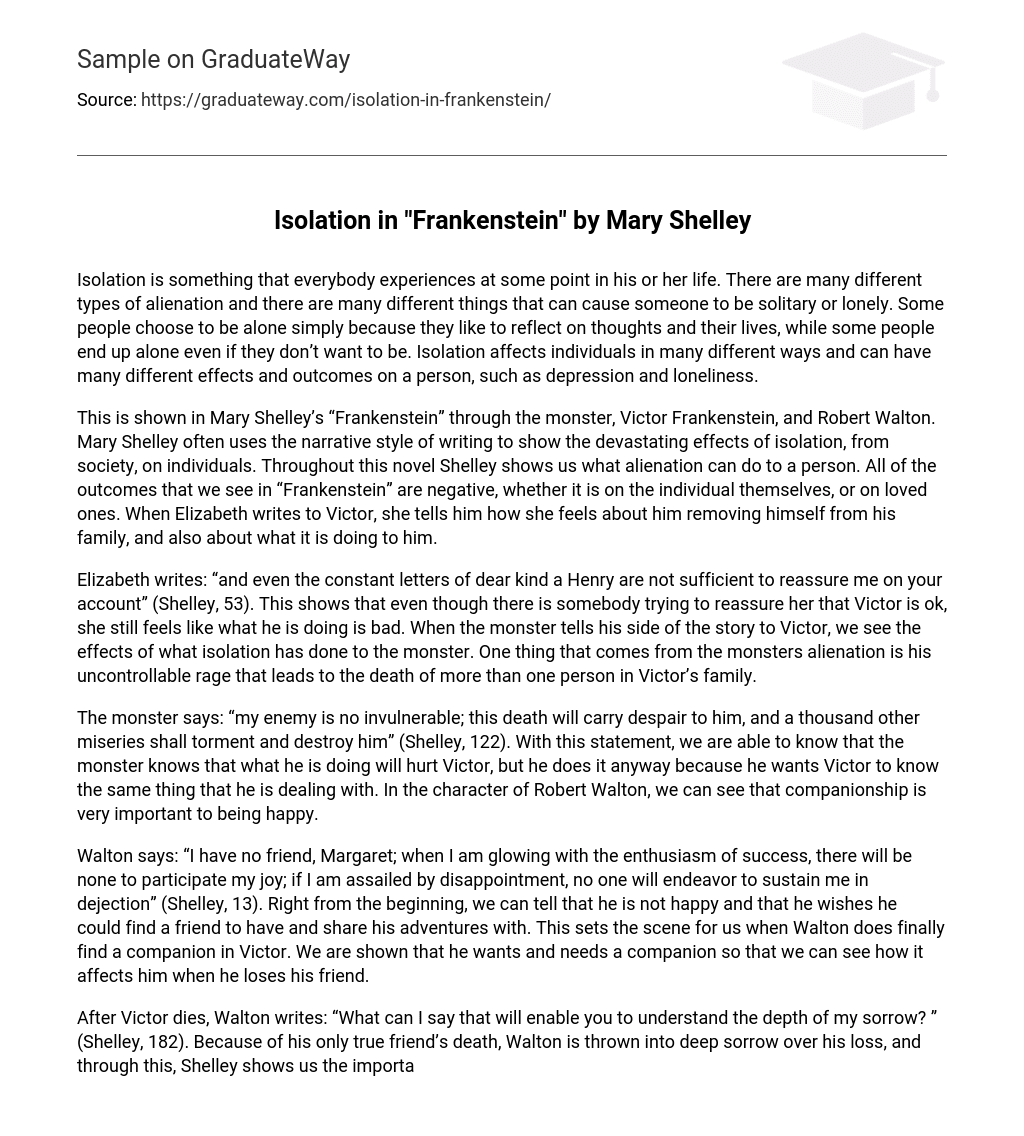Isolation is a universal experience that occurs at some point in everyone’s life. It can be caused by various factors and manifests in different forms of alienation. While some individuals prefer solitude to contemplate their thoughts and lives, others find themselves alone against their wishes. Isolation can impact individuals differently, leading to effects like depression and loneliness.
This theme is evident in Mary Shelley’s “Frankenstein” as illustrated by the monster, Victor Frankenstein, and Robert Walton. Shelley frequently employs the technique of narrative writing to demonstrate the profound impact of isolation from society on individuals. In this novel, Shelley highlights the destructive consequences of alienation. Every consequence depicted in “Frankenstein” is detrimental, either to the individual or their loved ones. Elizabeth expresses her sentiments to Victor through a letter, conveying her disapproval of his detachment from his family and its detrimental effect on him.
Elizabeth expresses her concern for Victor despite the assurance she receives in the form of constant letters from dear Henry (Shelley, 53). This indicates that she still considers Victor’s actions to be negative despite attempts to reassure her. The monster’s narrative to Victor sheds light on the effects of isolation on the monster. One consequence of the monster’s loneliness is his uncontrollable anger, which results in the death of multiple individuals in Victor’s family.
The monster acknowledges that his enemy is not invulnerable and believes that by causing his enemy’s death, he will inflict despair and numerous other miseries upon him, thus tormenting and destroying him (Shelley, 122). Despite being aware of the harm it will cause Victor, the monster proceeds with his actions in order to make Victor understand the suffering he endures. The importance of companionship for happiness is evident in the character of Robert Walton.
According to Walton (Shelley, 13), he lacks a friend who can share in his joy and offer support during times of disappointment. His longing for companionship is evident from the start, influencing his search for a friend throughout the story. Eventually, he finds a companion in Victor, allowing us to witness the impact of losing a friend on Walton’s wellbeing.
After the death of Victor, Walton expresses his grief, writing: “What can I say that will enable you to understand the depth of my sorrow?” (Shelley, 182). This highlights the significance of companionship in one’s life as Walton mourns the loss of his only true friend. Similarly, Shelley demonstrates how Victor’s isolation from friends, family, and society leads to severe depression. Victor isolates himself during the creation process and immediately flees once the creature comes to life. He briefly visits his family but eventually leaves them as well.
Throughout the story, Victor repeatedly experiences bouts of depression and deals with his pain by isolating himself. This is evident when he confesses, “For weeks I led a miserable life in the woods, endeavoring to sure [sic] the wound which I had received” (Shelley, 121). This illustrates that seclusion is an ineffective method of addressing our wounds and reinforces the notion that avoidance only exacerbates problems rather than resolving them. Victor opts for isolation as a way to cope with his pain and resolve his issues, but instead, it ultimately contributes to his downfall.
Despite being aware that his actions are morally wrong, Victor deems them necessary. This is evident in his statement: “I must absent myself from all I love while thus employed. Once commenced, it would be quickly achieved, and I might be restored to my family in peace and happiness” (Shelley, 147). It is evident that Victor acknowledges his potential loneliness and unhappiness during his isolation, but he intends to reunite with his loved ones once he completes his task. Mary Shelley’s novel emphasizes the importance of community in attaining happiness in life.
The theme of community and rejection is evident in Frankenstein, highlighting the negative consequences of being excluded from society. The creature’s longing for love and acceptance is repeatedly thwarted as it makes numerous attempts to fit in. Eventually, it resigns itself to the fact that it will never be embraced by humans (Brannstrom, 11). The constant rejection takes its toll, pushing the creature into a state of perpetual misery.
The text demonstrates that individuals who desire acceptance but do not receive it tend to become depressed and unhappy. Both Robert Walton and Victor Frankenstein opt for isolation as they are more interested in pursuing their thirst for adventure and knowledge. Walton’s intense craving for knowledge is evident in his statement: “There is a love for the marvelous, a belief in the marvelous, intertwined in all my projects, which hurries me out of the common pathways of men, even to the wild sea and unvisited regions I am about to explore” (Shelley, 20).
This text highlights how lust for knowledge causes both Walton and Victor Frankenstein to become isolated from society and ultimately leads to unhappiness in their lives. Walton’s desire for knowledge prevents him from forming companionships and leaves him alone. Similarly, Victor’s insatiable thirst for knowledge drives him to isolate himself, prioritize learning above his relationships, and eventually fall into depression and misery. The text emphasizes the detrimental impact of isolation on individuals.





